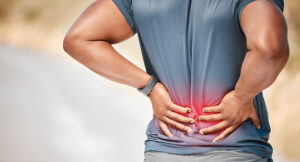
What Your Body is Trying To Tell You When it Hurts
Being in pain is not unlike being hangry (hungry + angry) — you’re not in the mood to reason and you just want it to stop. While that’s understandable. there’s a lot to unpack when it comes to pain. And the more you know, the less you have to worry about the cause or severity of your pain.
Muscular tension or spasming is responsible for most of the pain people experience. Muscles respond to your activities or lack thereof. If your daily routine includes repetitive movements, long-term sitting or sports, muscle tissue will respond with visceral feedback.
Pain that comes on suddenly feeling tight, constricted or crampy is typically muscular. Muscles literally need to be fed and watered to stay relaxed and pain-free. Along with organs and skin, blood nourishes muscle tissue, rendering it supple and relaxed. A tense muscle literally feels knotty or stringy under your fingers, whereas a relaxed muscle feels soft and flexible.
Sitting at a desk all day makes the muscles in your gluteal and hip area tense, which often sends discomfort up the chain to the low back. You also may feel sitting-related pain on your hamstrings or even hip joint. As many gluteal muscles attach at the hip joint, tight glutes tug on the hips.
A spasming muscle involuntarily and forcefully contracts, causing mild discomfort to intense pain. Spasms are typically harmless and could indicate overuse, dehydration, lack of nutrients and, in some cases, underlying medical conditions. Some medications, such as statins, are associated with muscle spasms.
Conversely, muscular pain or cramping may be due to overuse. Say you ran a marathon yesterday on a hot day and went straight to bed without properly hydrating. If you wake up at night with leg cramps, that’s just your muscles saying they need more fluid as dehydration can decrease blood volume. Leg cramping at night can point to many conditions, so if symptoms persist it’s best to contact your physician.
If your pain is associated with swelling then most likely there’s more involved than just a tight muscle. Swelling can indicate a strain, tear or even a fracture. Only a medical professional can determine exactly which type of injury is involved. Sometimes orthopedic exams can yield enough information to rule out fractures. But you may need an X-ray or MRI to determine the extent of your injury. Both tendons and ligaments can tear. If you’ve torn these tissues, the next step is to determine the extent of the tear. Less severe tears can heal on their own while severe tears or ruptures may require surgery.
If a nerve is impinged or injured, you may feel pain but it’s often different than muscular pain. Nerve-related pain can feel stabbing, shooting or burning. Some nerve issues don’t manifest in any pain. Neuropathy may present as numbness or tingling in the affected area. Neuropathy has many causes, including diabetes, bulging discs and muscular issues. If you’ve ever felt tingling down the back of your leg after long-term sitting, this may simply be gluteal muscles squeezing your sciatic nerve. The same nerve can be affected by a bulging or ruptured disc.
How can acupuncture help? If you’re experiencing neuropathy, most acupuncturists are trained to distinguish between a muscular vs. internal issue. It may not be possible to pin point the exact internal cause — whether it’s diabetes, multiple sclerosis or other conditions — but experienced providers can identify enough symptoms to know how to refer.
If muscular tension or spasming is causing your pain — which is far and away the most common cause of back pain — acupuncture treatments can provide substantial and, in many cases, immediate relief.
When swelling is part of your pain picture, acupuncture also excels at not only at reducing swelling, but also guiding healing nutrients to an injury site. Whether you have a sprain, strain, tear or fracture, with acupuncture you’ll heal more quickly, with less pain and less scar tissue.
You can’t always diagnose your own injuries, but knowing what’s behind certain symptoms can remove the fear factor. When you’re in pain just remember it doesn’t always mean drugs or surgery. Even if you do need biomedical intervention, acupuncture can dramatically improve your recovery in every stage of the healing process.